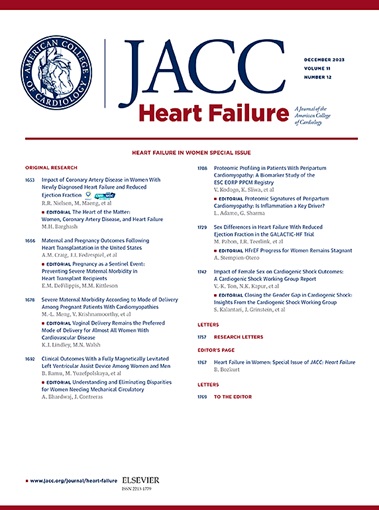Body Composition and Survival in Patients With Heart Failure
IF 10.3
1区 医学
Q1 CARDIAC & CARDIOVASCULAR SYSTEMS
引用次数: 0
Abstract
Background
Body composition is increasingly recognized as an important factor in the prognosis of patients with heart failure (HF). Variations in muscle mass, fat-free mass, and fat mass may influence survival outcomes, but the extent of these associations remains unclear.
Objectives
This study aims to evaluate the impact of body composition parameters on survival in patients with HF.
Methods
Five databases were searched through January 2024. Eligible papers reported associations between body composition parameters and survival in HF patients. All-cause mortality was the primary outcome. Risk of bias was evaluated using the Newcastle-Ottawa scale. A random-effects model was used to calculate the 95% CI and HR, with heterogeneity assessed using Cochran’s Q and I2 tests.
Results
The analysis included 39 cohort studies involving 36,176 HF patients, with 21 studies included in the quantitative analysis. Low muscle mass (HR: 1.73 [95% CI: 1.32-2.26]; I2 = 47%) (7 studies) was significantly associated with increased all-cause mortality risk. The prognostic significance of low muscle mass remained consistent across sensitivity and subgroup analysis. Elevated fat mass was not associated with a risk of death (pooled adjusted HR: 0.75 [95% CI: 0.26-2.12]; I2 = 77%). Higher abdominal fat showed no significant mortality association.
Conclusions
The authors found a strong association between body composition parameters and all-cause mortality. Muscular wasting, measured by low muscle mass, was associated with increased mortality, strengthening the role of muscle mass in HF prognosis. In contrast, higher fat mass and abdominal adiposity showed no association. These findings underscore the importance of comprehensive body composition evaluation in HF prognosis. (Association of Body Composition with Overall Survival in Patients with Heart Failure: A Systematic Review and Meta-Analysis; CRD42023488040)
心力衰竭患者的身体组成和生存:系统回顾和荟萃分析。
背景:身体成分越来越被认为是影响心力衰竭(HF)患者预后的重要因素。肌肉量、无脂肪量和脂肪量的变化可能影响生存结果,但这些关联的程度尚不清楚。目的:本研究旨在评估体成分参数对心衰患者生存的影响。方法:检索截至2024年1月的5个数据库。符合条件的论文报道了心衰患者体成分参数与生存率之间的关系。全因死亡率是主要结局。偏倚风险采用纽卡斯尔-渥太华量表进行评估。采用随机效应模型计算95% CI和HR,采用Cochran's Q和I2检验评估异质性。结果:分析纳入39项队列研究,涉及36176例HF患者,其中21项研究纳入定量分析。低肌肉质量(HR: 1.73 [95% CI: 1.32-2.26];I2 = 47%) (n = 7项研究)与全因死亡率风险增加显著相关。低肌肉质量的预后意义在敏感性和亚组分析中保持一致。脂肪量升高与死亡风险无关(校正后总风险比:0.75 [95% CI: 0.26-2.12];i2 = 77%)。较高的腹部脂肪与死亡率无显著关联。结论:作者发现身体成分参数与全因死亡率之间有很强的相关性。以低肌肉量衡量的肌肉萎缩与死亡率增加相关,这加强了肌肉量在心衰预后中的作用。相比之下,较高的脂肪量和腹部脂肪没有关联。这些发现强调了综合体成分评估在心衰预后中的重要性。心力衰竭患者身体成分与总生存率的关系:系统回顾和荟萃分析;CRD42023488040)。
本文章由计算机程序翻译,如有差异,请以英文原文为准。
求助全文
约1分钟内获得全文
求助全文
来源期刊

JACC. Heart failure
CARDIAC & CARDIOVASCULAR SYSTEMS-
CiteScore
21.20
自引率
2.30%
发文量
164
期刊介绍:
JACC: Heart Failure publishes crucial findings on the pathophysiology, diagnosis, treatment, and care of heart failure patients. The goal is to enhance understanding through timely scientific communication on disease, clinical trials, outcomes, and therapeutic advances. The Journal fosters interdisciplinary connections with neuroscience, pulmonary medicine, nephrology, electrophysiology, and surgery related to heart failure. It also covers articles on pharmacogenetics, biomarkers, and metabolomics.
 求助内容:
求助内容: 应助结果提醒方式:
应助结果提醒方式:


